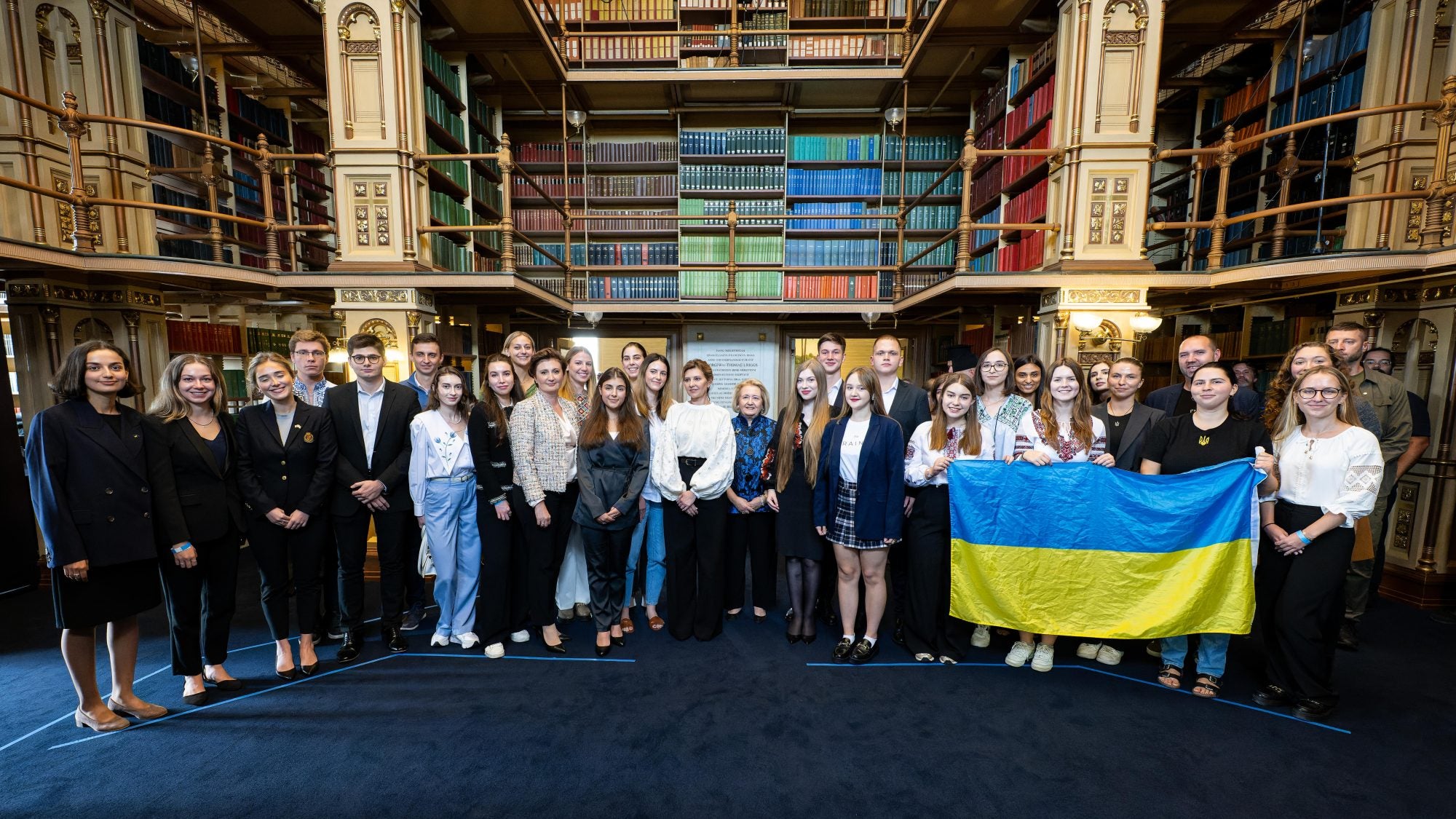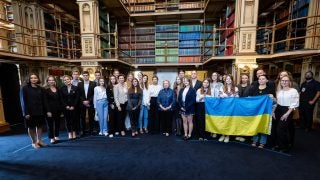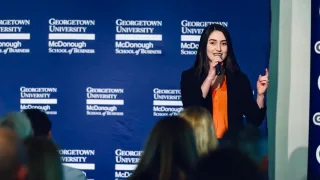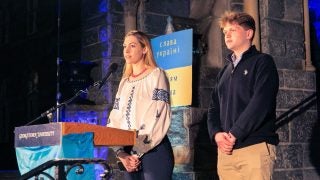A few days before his 17th birthday in February 2022, Kyryl Myronenko (SFS’26) was glued to his screen as he had trouble falling asleep. He had put off his Spanish homework so he could read the latest news on British and American intelligence reports. Myronenko and his family lived in Cherkasy, Ukraine, some 120 miles southeast of Kyiv.
When he woke up early on the morning of Feb. 24, he found his parents anxiously talking in the kitchen when he learned what had happened: Russia’s full-scale invasion of Ukraine had begun.
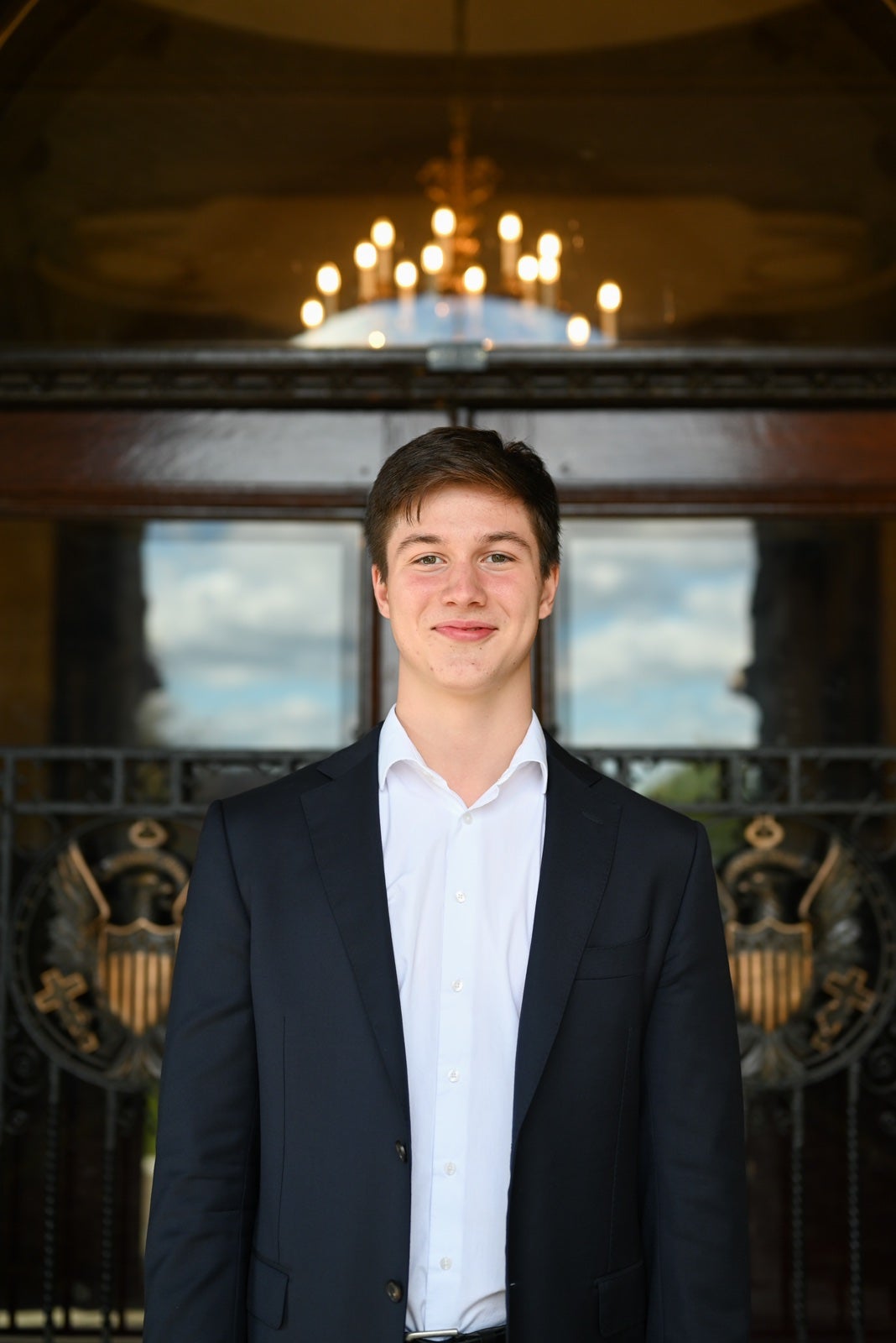
“Every single piece of Ukraine was impacted. You really didn’t know what was going to happen to you, to your family,” he said.
Amid great uncertainty in Ukraine, Myronenko’s parents made the difficult decision to send their son to the U.S. to pursue college.
Myronenko’s experience is not uncommon among the many Ukrainian students who have left their homes since the war broke out two years ago to pursue their education.
Soon after the war started, Georgetown announced the creation of the Gracias Family Sunflower Current Use Scholarship Fund. Funded by a $5 million gift from Antonio Gracias (SFS’92, G’93) and Sabrina Kuhl Gracias (B’93), the scholarship has supported 14 Ukrainian students at Georgetown, including undergraduates in all schools who demonstrate financial need as well as merit-based scholarships for graduate students in the School of Foreign Service (SFS).
“I feel like it’s an immense honor and responsibility, just understanding how much help and support I’m receiving to be able to do something that so many people would love to do,” said Myronenko, one of the inaugural recipients of the scholarship.
“You see so many horrors, so many inhumane acts … But then you see there’s people who never saw you in real life, who never heard of you, and then they just give so much of their own resources and money to support you and just to [create] change and, to some extent, save our lives.”
A Long Way From Home
Myronenko touched down in the U.S. in April. While his peers were starting to get acceptance letters to college, Myronenko had to start from scratch. He started calling dozens of colleges and universities across the country with the hopes of slipping in a last-minute college application.
When Georgetown’s admissions office gave him an opportunity to apply, he pulled together his application within the week. Getting accepted into Georgetown is a moment Myronenko will never forget.
“I was sitting in Bryant Park. The email pops up. I open it up, and it says, ‘You’ve been accepted to the Class of 2026,’” he said. “That was an incredible moment. I was in the middle of the street, but I wanted to start dancing and everything because in the midst of so many horrors going on back home in Ukraine, I was just like, ‘Wow, this is something to be so happy and thankful about.’”
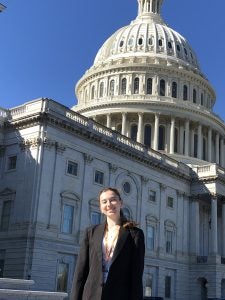
At the start of the war, 16-year-old Karyna Stepanovych (SFS’27) was in her hometown of Rivne in northwestern Ukraine. The sound of missiles, bombs and air raid sirens became a regular part of daily life, and Stepanovych fled with her family to a nearby village. They were cut off from internet access and had only a radio to tune into the latest updates from the battlefront.
As she started to think about college, Stepanovych knew she wanted to use her education to help Ukraine. When she discovered Georgetown and was also offered the scholarship, she knew the Washington, DC, location, quality academics and access to professors who are practitioners in the field would be invaluable.
“When the war started, I started to think about the ways that I can educate myself, what are the best ways for me to study,” said Stepanovych, who is studying international economics. “And simultaneously I also wanted to contribute to Ukrainian growth, so I wanted from my education to get something that I could actually use later in Ukraine to help my country recover from war … For me, this scholarship means first of all to utilize all the resources that I have now at Georgetown to help my country and to help overall make this world a better place as a person who will be working in the field of international affairs.”
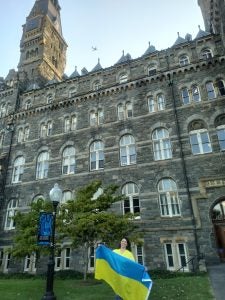
Ksenia Dubova (G’25), another scholarship recipient, had a similar motivation for pursuing her graduate studies at Georgetown. Originally from the now war-torn Zaporizhzhia in southeast Ukraine, she fled to Germany with her mother and two sisters in the early days of the war — her father and uncles stayed behind to join the war effort.
Dubova had spent much of the last seven years crisscrossing the world, working and volunteering in Croatia, Indonesia, Israel and Ukraine. Her international experiences and interest in development work nudged her to pursue Georgetown’s master’s in global human development.
“I wanted to study and be a part of the SFS at Georgetown, being in DC and learning more about international relations but also from the development point of view. I wanted the hard skills. I wanted to learn more about economics and [quantitative methods],” Dubova said. “I wanted the skills for my future career in development.”
Making the Most of Georgetown
Just barely a semester into her time on the Hilltop, Stepanovych wants to take advantage of as many opportunities as possible to learn and grow.
“I try to be involved in as many initiatives as possible on campus to utilize all the resources, to do all the internships that are possible and just to learn from all the people that surround me so that after graduation I can maximize and use everything that I learned here to make some change,” she said.
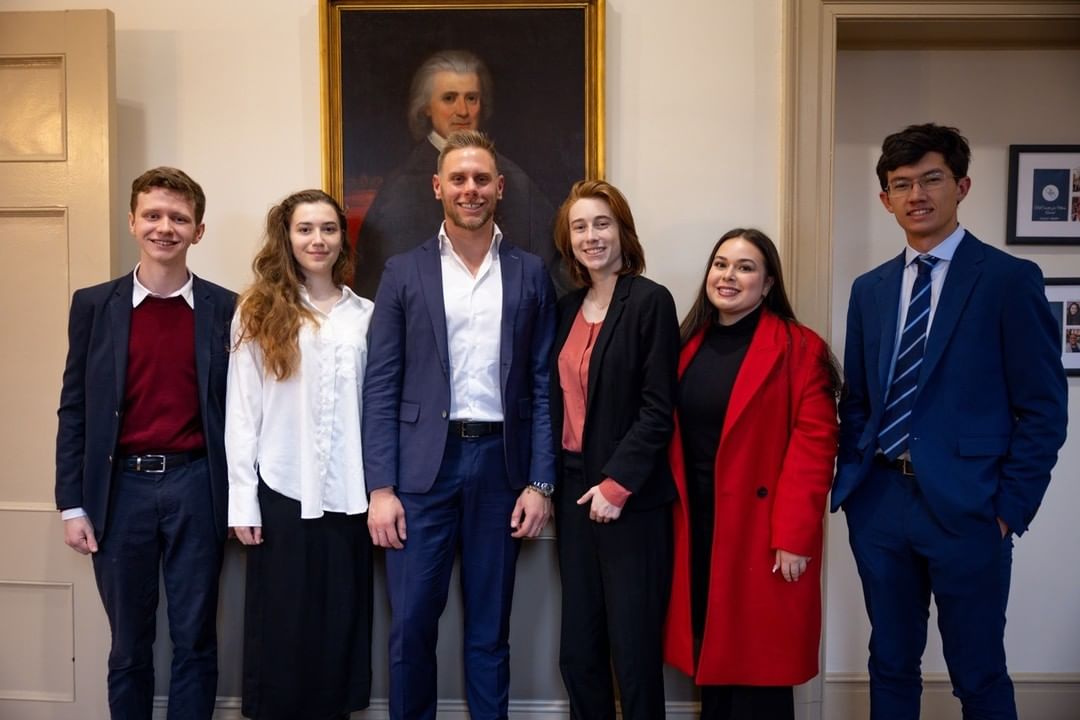
While she said her transition wasn’t easy, Stepanovych found a community in the Georgetown Model United Nations club. Last September, she traveled with the club to New York City for a conference and got a taste of what it would be like to work in international affairs, gaining confidence as a public speaker and connecting with other Georgetown students who made her feel welcome.
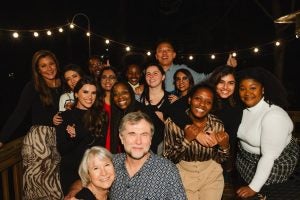
Stepanovych is also involved with the Institute of Politics and Public Service (GU Politics). She said a major highlight of her first semester was working with Joe Hack, one of the Fall 2023 GU Politics Fellows, and learning from his insights working on Capitol Hill while planning events and dialogues for GU Politics.
Dubova is eager to start digging into elective coursework and interning this summer overseas, a core component of her graduate program. She’s also involved with the Georgetown Anti-Poverty Society and works two part-time jobs on campus.
This past fall, Dubova also took opportunities to see high-profile speakers come to campus, such as the president of Indonesia and the Polish ambassador to the U.S. She even had the special opportunity to meet the first lady of Ukraine.
“It’s just inspiring to see her,” she said. “Seeing her in DC, it just feels closer to home.”
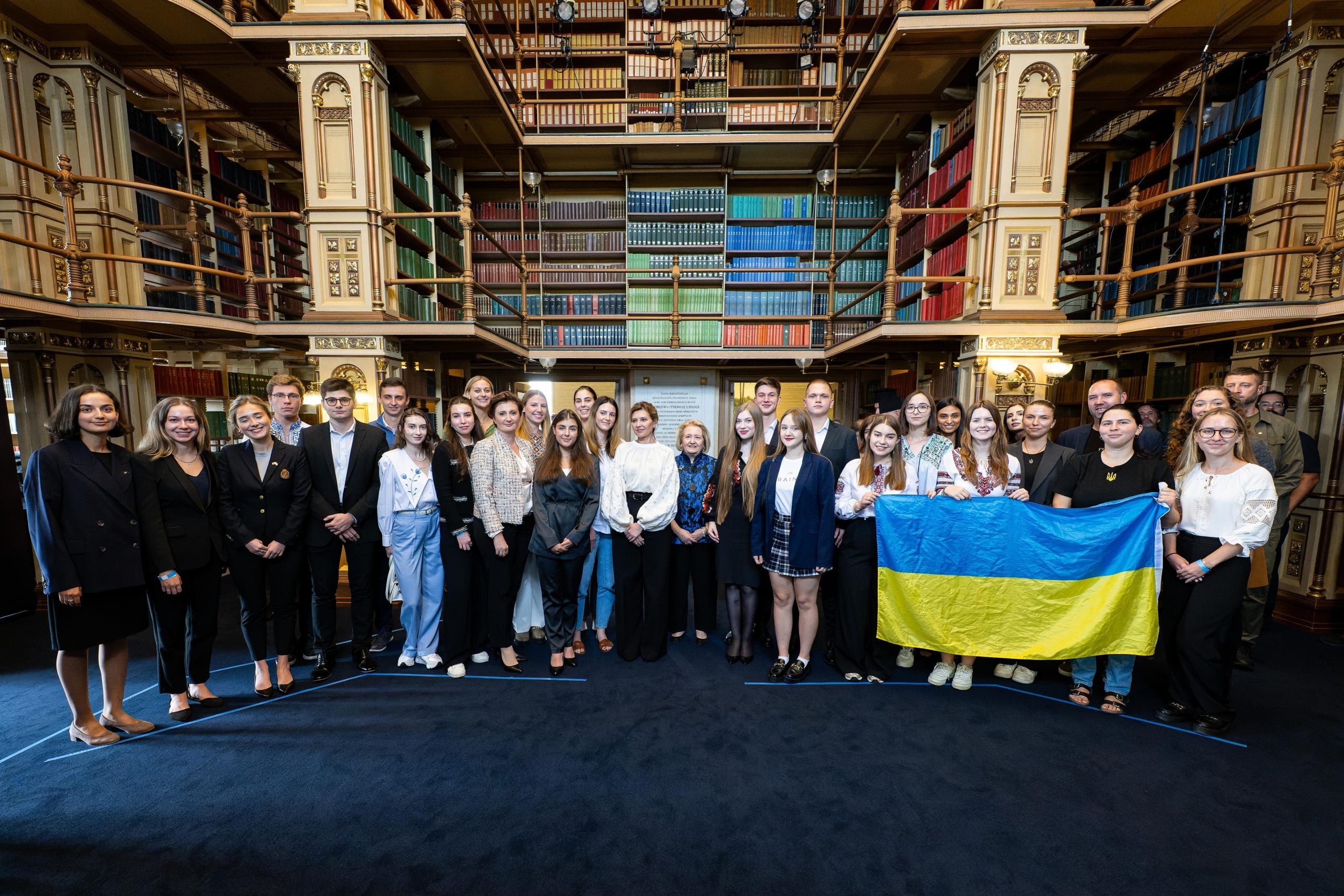
On the Hilltop, many Ukrainian students have also found a little piece of home in the Georgetown University Ukrainian Society (GUUS). Co-founded by Myronenko, GUUS hosts events for members of the Georgetown community interested in Ukraine, such as gatherings with the Ukrainian ambassador to the U.S. or events with various embassies in DC.
The club also takes time to come together as a community and remember important days in Ukrainian history, such as the start of the Russian invasion as well as the Independence Day of Ukraine.
This spring, Myronenko said the club will host a summit for students across the country interested in Ukraine to connect and discuss important issues at Georgetown.
For Myronenko, he’s made the most of his first two years at Georgetown. He’s joined consulting and investment clubs and enjoyed games of pickup soccer with friends at Yates Field House. But a highlight was interning in the office of former Speaker of the House Nancy Pelosi — a “super life-changing” experience, he said. And he doesn’t plan to slow down.
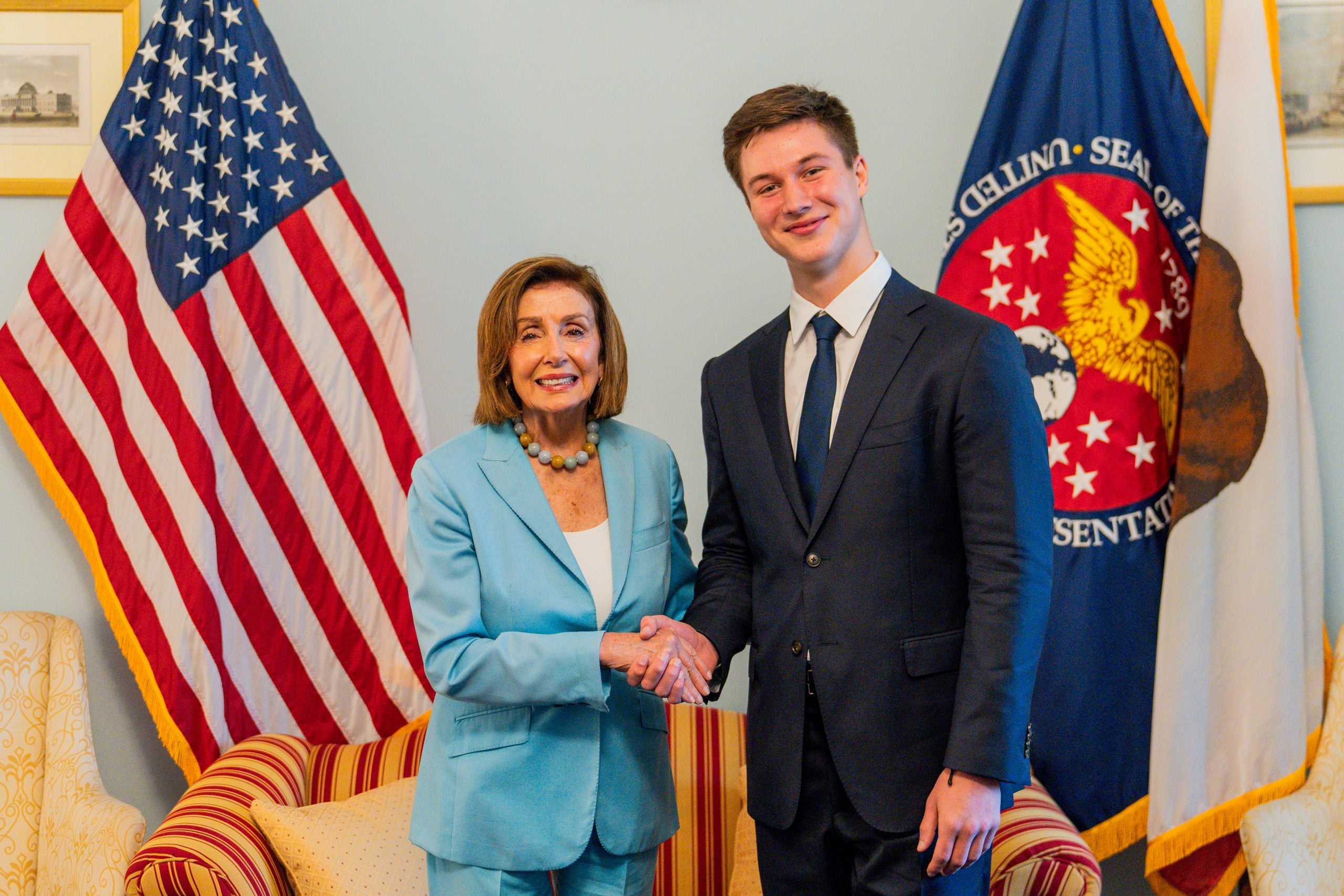
“I’m just going to experience every possible thing,” Myronenko said. “If there’s a chance to go for a retreat to Shenandoah, I go there. If there’s a chance to participate in this stock pitch competition, I do that. If there’s a chance to take this very fun one-credit class with my friends … I’m going to do it. If there’s a chance to pursue all the extra minors, all the certificates, all the interesting classes, all the great professors I could meet, I’ll do it.”
Dreams for Post-War Ukraine
For many of the Ukrainian students studying abroad, they hope to return to a post-war Ukraine and help their nation rebuild after years of destruction and death.
After studying post-war reconstruction and political economy case studies in her courses, first-year Stepanovych is starting to build a strong foundation and confidence in her knowledge that she plans on taking back to Ukraine.
“I’ll have this vision of how [post-war reconstruction] works. While I’m studying here, I can see how this vision is forming and how I have this confidence of how legislative processes must look like in Ukraine in the case of post-war rebuilding,” she said.
